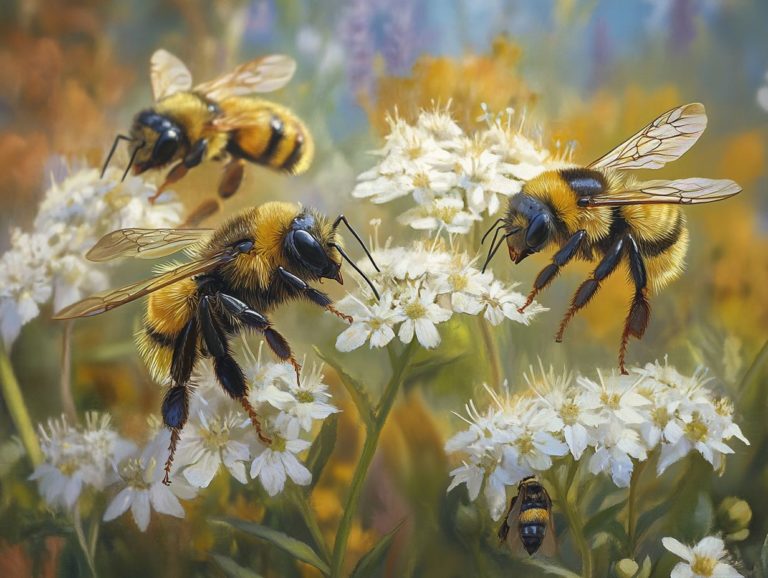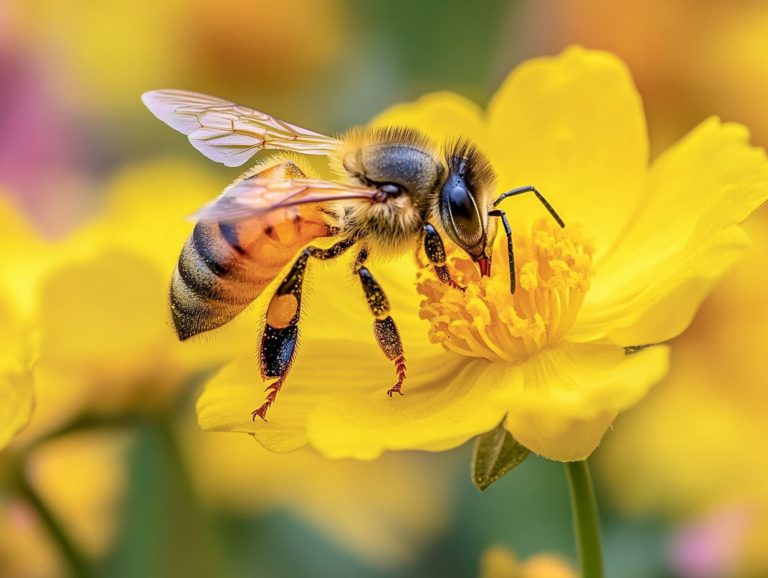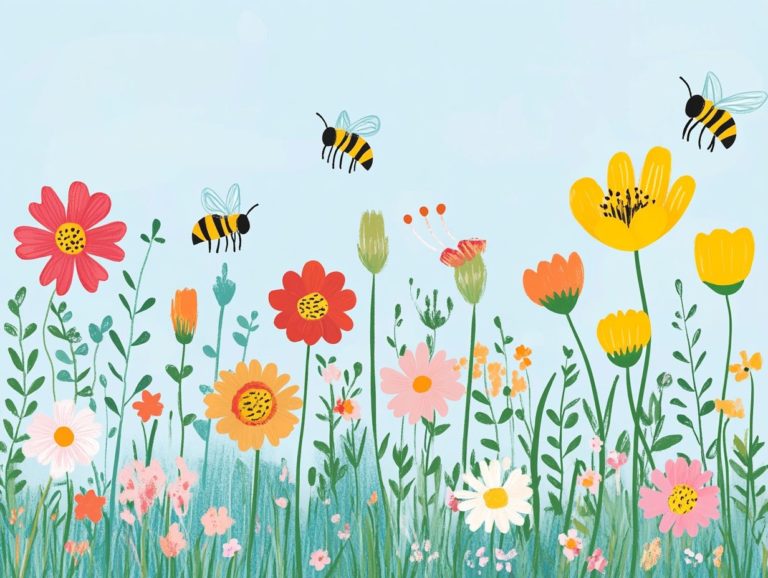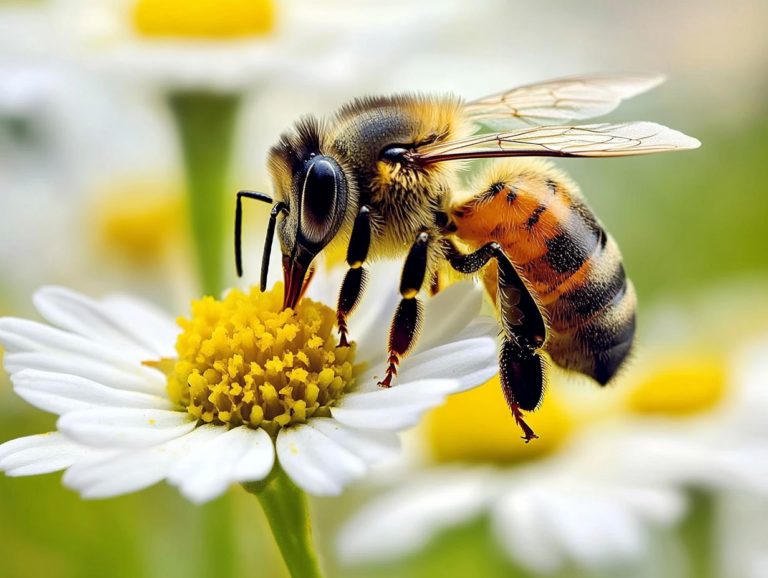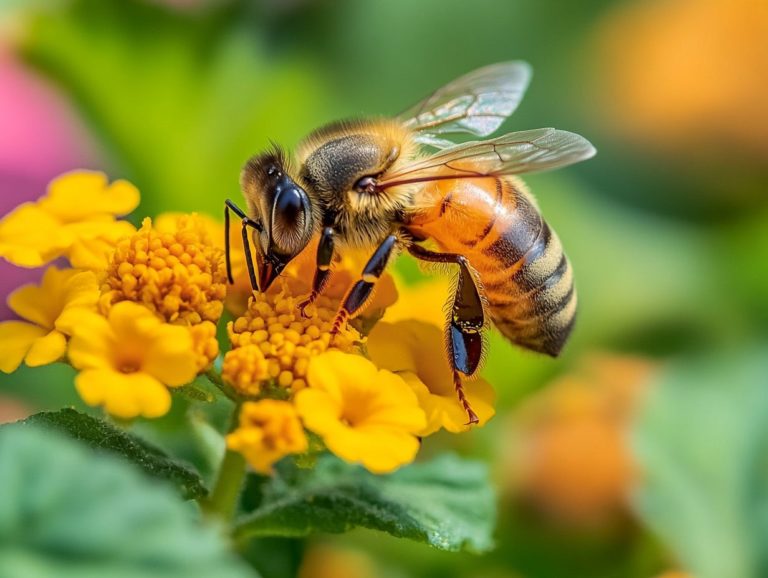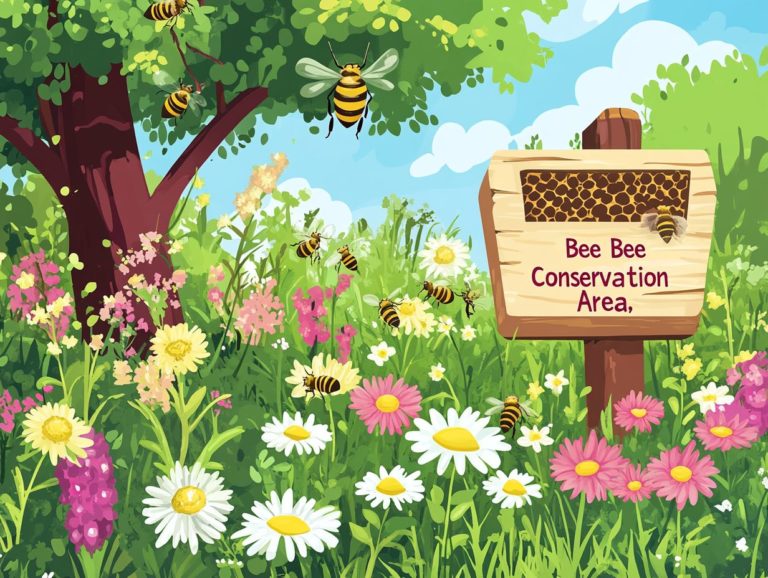Why Bees Are Essential for Ecosystems
Bees are essential to the health of our ecosystems. They serve as invaluable pollinators that support both biodiversity and food production. Different bee species, including honey bees, play a crucial role in this process.
This article delves into the significance of bees. It highlights their critical role in pollination and their contributions to the rich tapestry of life that surrounds us. However, bee populations face serious threats, such as pesticide use, habitat loss, and colony collapse disorder. Colony collapse disorder is when the majority of worker bees in a colony disappear, leaving the queen and a few bees behind.
We must recognize these challenges and act now to protect bees. Their survival is essential for our environment and food systems. Conservation efforts and sustainable practices are important. Explore with us the numerous reasons to appreciate and safeguard these extraordinary creatures.
Contents
Key Takeaways:
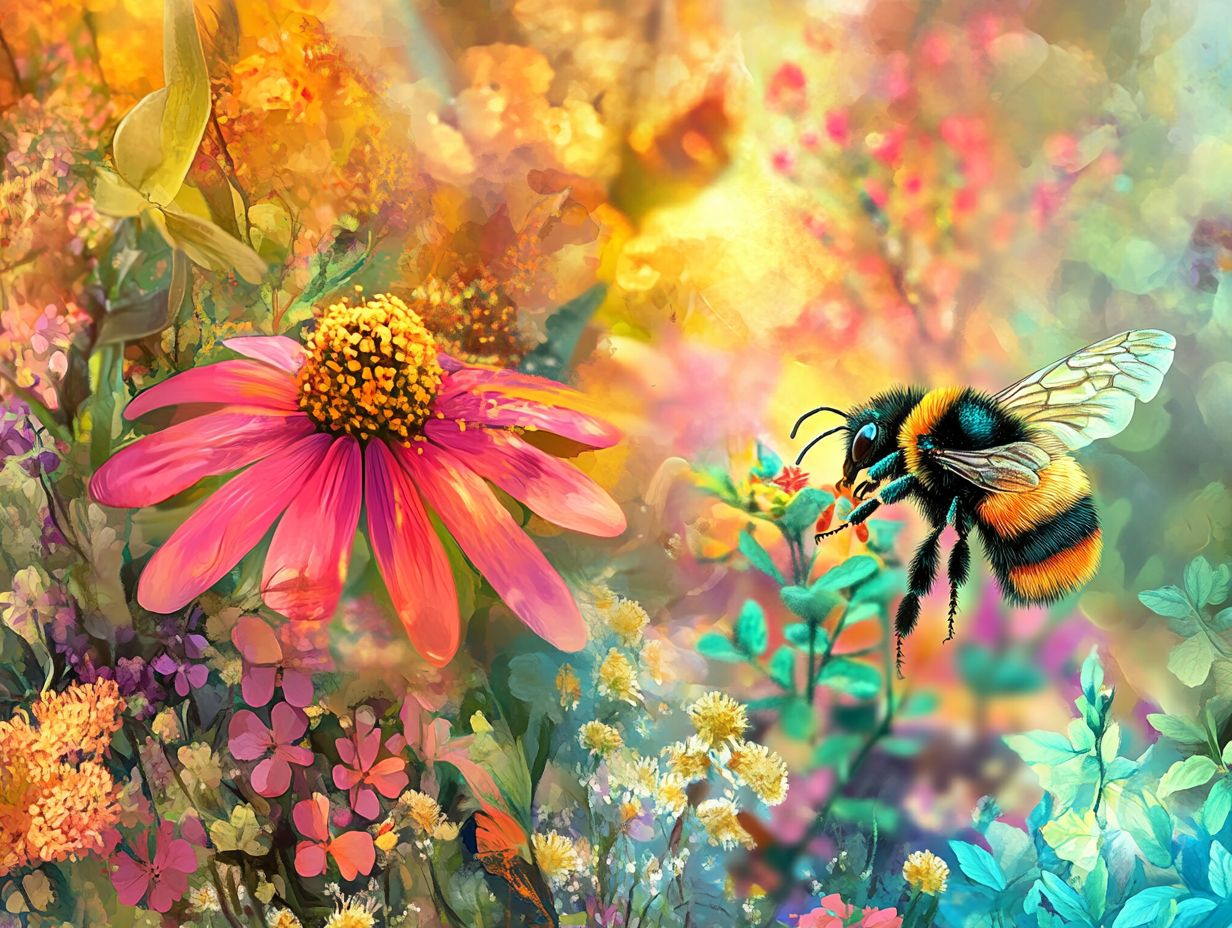
Why are Bees Important for Ecosystems?
Bees hold a crucial position in maintaining the balance of our ecosystem and enhancing biodiversity, both of which are vital for the important for keeping agricultural lands and the overall health of our planet. Without these essential pollinators, we would struggle to produce many of the fruits and vegetables we rely on for food.
Bees play a key role in preventing biodiversity loss. They help flowering plants reproduce, which supports a variety of species within the ecosystem.
Considering the ongoing 2024 presidential election and the ensuing climate policy discussions, the preservation of bee populations has become a significant topic for promoting sustainable practices and addressing the effects of industrial agriculture.
What is Pollination and How Do Bees Help?
Pollination is the remarkable process where bees and other pollinators transfer pollen from the male parts of flowers to the female parts, helping plant reproduction and ensuring the production of fruits and seeds. This underscores the importance of pollination for food security and ecosystem balance.
This intricate dance not only supports individual plants in their reproductive quests but also plays an essential role in sustaining entire ecosystems. Bees, particularly honeybees and various wild species, are invaluable participants in this process. As they flit from bloom to bloom in search of nectar, they unwittingly gather pollen, depositing it on other flowers and enhancing genetic diversity and plant resilience. The health of agricultural systems hinges on these dedicated pollinators.
Their industrious efforts significantly boost crop yields, ensuring that fruits, vegetables, and nuts thrive abundantly. The vibrant wildflowers that flourish in natural habitats provide critical resources for bees, especially as climate change reshapes landscapes and alters flowering patterns. This highlights the pressing need for conservation efforts and sustainable practices to protect these crucial insects and their essential roles in food production and ecological balance.
It’s time to act! Protecting bees is not just a choice; it s essential for our future.
How Do Bees Contribute to Biodiversity?
Bees play a crucial role in enhancing biodiversity by pollinating a diverse array of plants. This supports the growth of various crops and helps maintain the delicate balance of ecosystems. Bee species diversity is vital for this role.
Their contributions extend far beyond simply cultivating our food. These hardworking insects are vital for making sure wildflowers flourish and ecosystems thrive! They are essential for the reproduction of numerous wildflowers and native plant species. This rich diversity of flora provides habitat and sustenance for other wildlife, creating a vibrant ecological network and maintaining ecological balance.
The threat of habitat loss due to urbanization and agricultural expansion endangers bee populations. This underscores the urgent need for sustainable practices. By advocating for strategies that protect these vital pollinators, you can help secure food sources and mitigate risks to food security.
Ultimately, grasping the intricate relationship between bees and plants is crucial for preserving ecological health and ensuring a sustainable future for all. Community action and support for Friends of the Earth and other organizations are essential.
What is the Role of Bees in Food Production?
Bees are absolutely essential to food production. A substantial portion of the crops you depend on for nourishment relies on their pollination. These remarkable creatures are important for farming and crucial for beekeeping.
Their influence extends to a wide array of fruits, vegetables, nuts, and even seeds. All of these struggle to flourish without the diligent efforts of these pollinators. Take crops like almonds, blueberries, cucumbers, and apples, for example. They thrive significantly thanks to the activity of bees.
However, the alarming decline in bee populations presents formidable challenges not only to honey bee production but also to the overall sustainability of agriculture. Practices commonly found in industrial agriculture, such as pesticide use and monocultures, pose serious threats to these vital species.
In response to these challenges, conservation efforts are gaining momentum. This highlights the necessity of habitat restoration and responsible farming techniques. By supporting these initiatives, you can help maintain the delicate balance of ecosystems and protect these essential pollinators. This aligns with the Sustainable Development Goals set by the United Nations.
Threats to Bee Populations
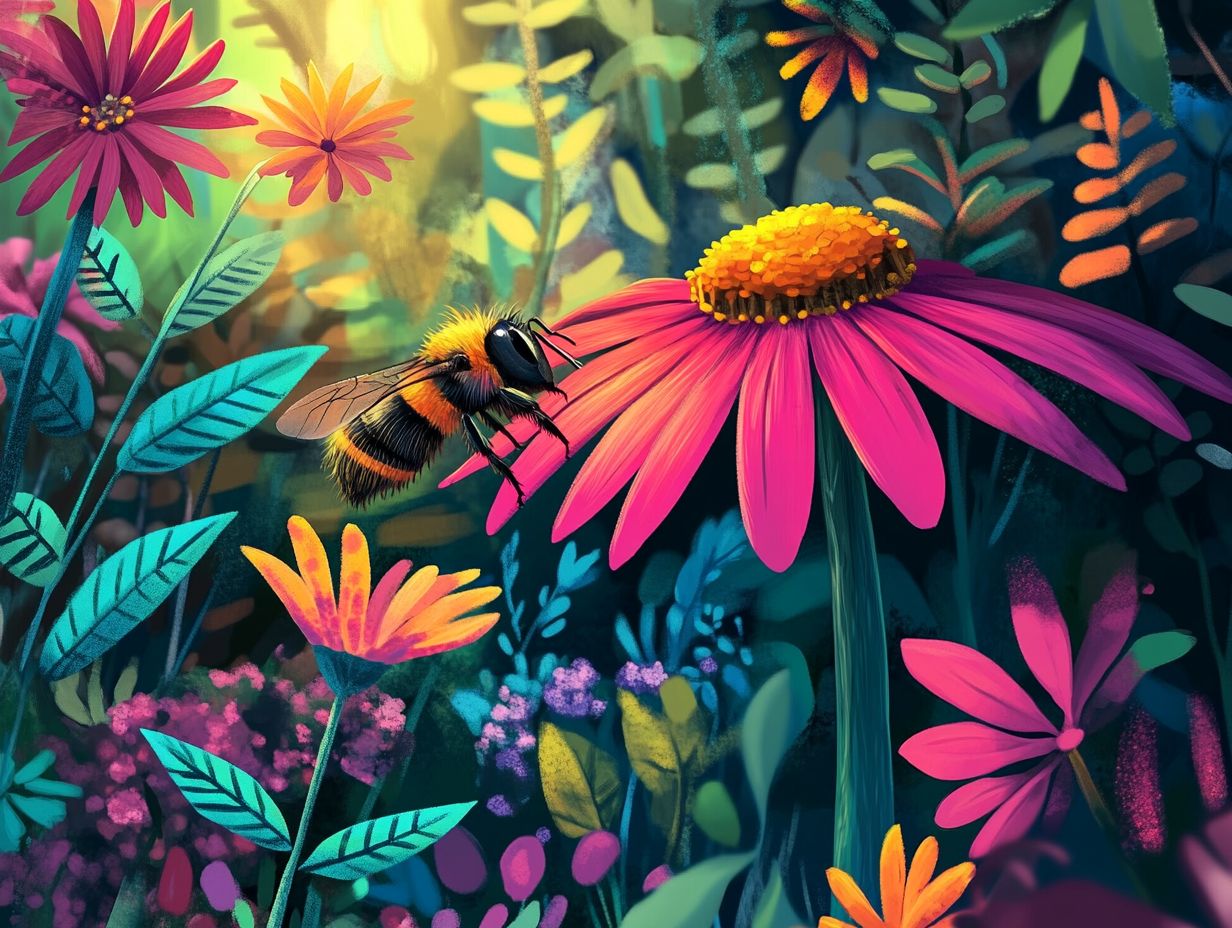
The decline in bee populations has emerged as a significant concern, driven by a complex interplay of threats. Habitat loss, pesticide use, and the detrimental impacts of industrial agriculture all conspire to destabilize these vital populations. The impact of global warming further exacerbates these challenges.
As you consider the implications, it becomes clear how interconnected these issues are. This highlights the urgent need for awareness and action at both the community and governmental levels. Figures like Trump and Harris have addressed these issues.
What are the Main Causes of Declining Bee Populations?
Several significant factors contribute to the declining bee populations. It s essential to recognize them. Habitat loss due to urbanization and agricultural expansion plays a major role, alongside the widespread use of pesticides that adversely impacts bees’ health. Varroa mite infestations also pose a severe threat to bee colonies.
These issues are closely linked to industrial agriculture practices that often prioritize high yields over biodiversity. When farming becomes intensive, it frequently results in monocultures, significantly reducing the variety of flowering plants crucial for bees nutrition. The destruction of habitats eliminates nesting sites and diminishes the forage that bees depend on for survival.
Realizing how important bees are for our food supply is crucial. The United Nations and the Food and Agriculture Organization have initiated campaigns to raise awareness about their plight. Organizations like Friends of the Earth are actively advocating for sustainable practices. They encourage both governments and communities to implement policies that protect these vital pollinators from further decline. You can make a difference by becoming aware and taking action!
How Do Pesticides Affect Bees?
Pesticides significantly impact bee populations, disrupting their communication, navigation, and overall health elements vital for maintaining the balance of nature.
Certain pesticides, especially neonicotinoids (a class of neuro-active insecticides modeled after nicotine), impair the cognitive functions of these essential pollinators. This makes it increasingly challenging for them to locate food sources or find their way back to their hives.
The consequences of this decline in bee health are serious. Reduced pollination efficiency directly affects crop yields and biodiversity.
As agricultural expansion continues to encroach on their habitats, it s crucial that we adopt sustainable practices now to protect our bees! By embracing integrated pest management techniques managed ways to control pests using various methods instead of just chemicals and exploring chemical alternatives, farmers can play a crucial role in mitigating the adverse effects on bee populations while ensuring the sustainability of their cultivation methods. Organizations such as Greenly are also advocating for these practices.
What is Colony Collapse Disorder?
Colony Collapse Disorder (CCD) is a concerning phenomenon marked by the sudden vanishing of worker bees from a colony, leading to a dramatic decline in bee populations. This alarming trend raises significant concerns about the impacts of global warming, pesticide use, and overall environmental health.
This distressing condition also puts the bees at risk and endangers the critical pollination services they provide services that are essential for maintaining agricultural production and food security.
As bee populations shrink, the effects ripple through ecosystems, threatening biodiversity and the delicate balance of nature. Factors such as pesticides, habitat loss, and climate change intensify the challenges, placing immense pressure on these essential pollinators. The Food and Agriculture Organization has been proactive in addressing these issues.
The negative implications for bee populations present a formidable obstacle to achieving sustainable development goals, particularly those aimed at combating hunger and fostering responsible farming practices. It is vital to confront these environmental stressors to protect both bee populations and the broader ecological equilibrium, as highlighted by initiatives in the UK and other countries.
The Impact of Losing Bees on Ecosystems
The decline of bee populations directly harms our ecosystems, resulting in significant biodiversity loss and endangering agricultural productivity. This also amplifies the risks to food security and ecological balance.
This poses a serious threat to food security and the overall health of our ecosystems.
How Does the Loss of Bees Affect Other Species?
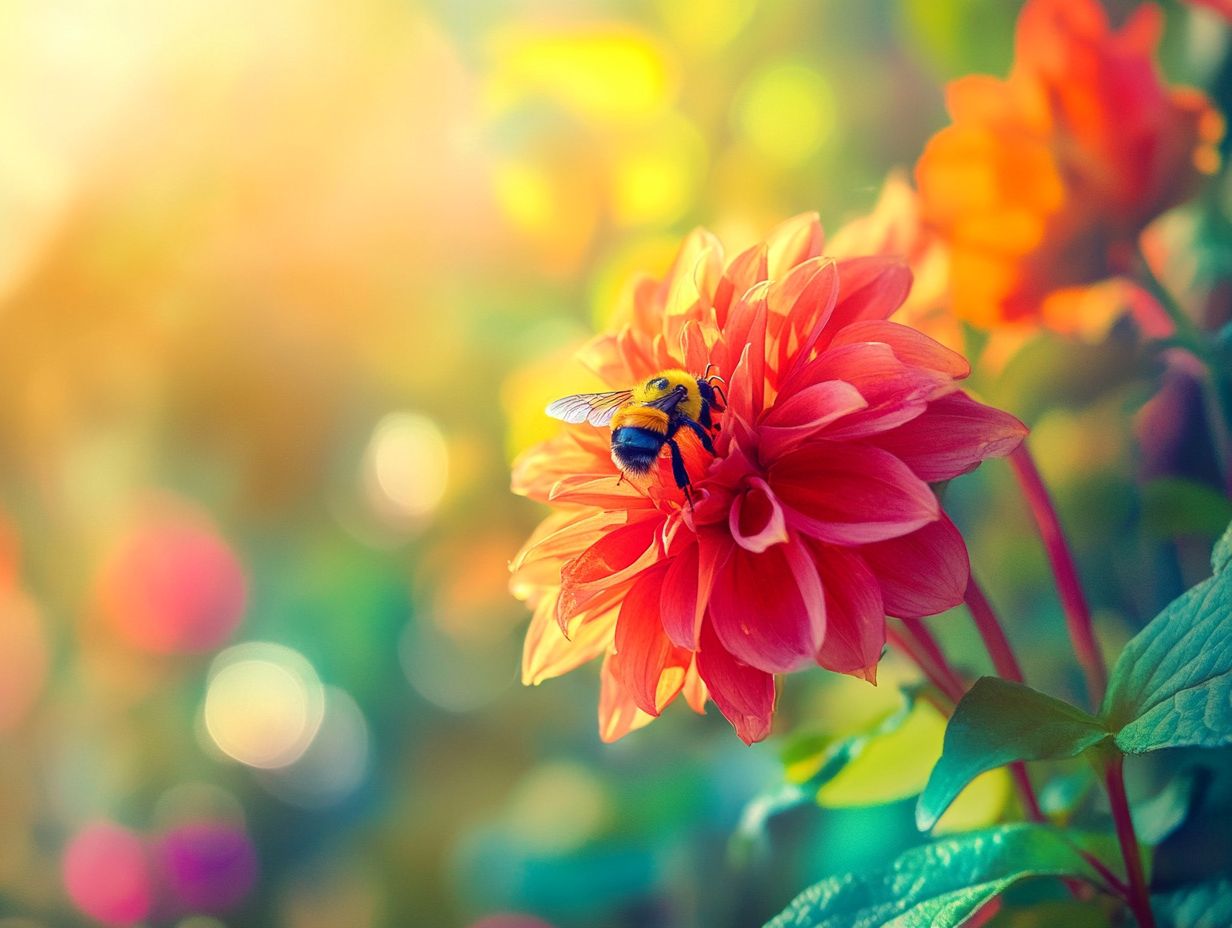
The decline of bee populations, often exacerbated by factors such as global warming and pesticide use, disrupts the delicate balance of ecosystems. This leads to a significant drop in biodiversity that impacts not only the plants they pollinate but also the myriad species that rely on those plants for sustenance and habitat.
As bee populations dwindle due to habitat loss and pesticide use, the flowers dependent on their pollination struggle to reproduce. This results in fewer seeds and fruits.
This creates a cascading effect; herbivores that depend on these plants face food shortages, which subsequently affects the predators higher up the food chain.
In essence, entire habitats are disrupted, impacting countless organisms. To maintain ecological balance and counter the effects of industrial agriculture, you must embrace sustainable practices, such as planting bee-friendly flora and minimizing pesticide use. These actions not only support bee populations but also enhance overall biodiversity.
By cultivating an environment where these vital pollinators can thrive, you help preserve the health of entire ecosystems, ensuring food security and vibrant wildlife, including diverse bee species, for generations to come.
Join us in protecting our bees by supporting sustainable farming practices!
What Happens to Food Production Without Bees?
Without bees, food production faces serious challenges due to the agricultural land’s dependence on their pollination. This reliance can lead to diminished agricultural productivity and heightened risks to food security.
Consider the impact on fruits like apples, cherries, and blueberries. Vegetables such as cucumbers and peppers are also affected. These crops are particularly vulnerable to declines in bee populations, a situation where many bees in a hive die or leave, which is harmful to their population. When these crucial pollinators vanish, not only does the yield of these crops plummet, but the quality of the produce also deteriorates. This ultimately affects your access to fresh and nutritious food.
To address these pressing issues, adopt sustainable practices. Create pollinator-friendly habitats and support local beekeeping initiatives. Community actions like establishing urban bee gardens and participating in conservation efforts can raise awareness and promote biodiversity. This ensures that these essential pollinators continue to thrive for generations to come.
Collaboration among farmers, environmentalists, and local governments, along with the support of organizations like Friends of the Earth, can create a robust support system for bee populations. This ultimately sustains the food supply chain you rely on.
Ways to Protect and Support Bee Populations
Protecting and supporting bee populations is vital for preserving biodiversity and ensuring sustainable agricultural practices. Everyone in the community needs to help, alongside dedicated conservation initiatives and knowledge-based decision-making. Efforts must address the impact of climate change and mitigate the effects of global warming on bee populations.
By acting together, you contribute to a thriving ecosystem that benefits everyone, including various bee species and other insects crucial for pollination.
What Can Individuals Do to Help Bees?
Act now to support our bees! Your actions can make a real difference. Embrace sustainable practices, create bee-friendly habitats, and advocate for policies that safeguard these essential pollinators. Support climate policies to protect bees from global warming.
Weave simple changes into your daily routine. Planting wildflowers and native plants can transform your space into a vibrant haven that provides vital food sources for these crucial creatures. Reducing pesticide use not only protects the bees but also fosters healthier ecosystems overall. Engaging in local beekeeping helps boost bee populations and contributes to honey production.
Engage with local conservation initiatives to make a difference. Volunteer for bee habitat restoration projects or participate in educational workshops that highlight the importance of pollinators. Sharing insights in community forums can elevate awareness about the alarming decline in bee populations and galvanize action. Your neighborhood needs you! Get involved locally to make a bigger impact!
Through your efforts, you play a significant role in preserving bee species and their habitats for future generations. Understanding bee communication and behavior can further enhance conservation strategies.
Every action counts! Start your bee-friendly garden today!
What are Some Government and Corporate Initiatives for Bee Conservation?
Government and corporate initiatives are essential for bee conservation. Various programs are dedicated to protecting habitats, regulating pesticide use, and promoting environmentally friendly methods. The Food and Agriculture Organization (FAO) and the United Nations (UN) play significant roles in these efforts. These initiatives are often part of broader Sustainable Development Goals (SDGs).
These efforts aim not just to keep bee populations alive; they also contribute to larger goals that foster ecological balance. For example, the European Union’s Green Deal includes concrete measures designed to support pollinator health and enhance biodiversity. Similar initiatives are being undertaken in the UK and other countries to combat biodiversity loss and support bee conservation.
On the corporate side, many companies are stepping up by pledging to cut back on harmful pesticide use and promote organic farming methods. These actions are vital to protect bees and ensure a healthier planet!
By establishing measurable targets, these initiatives aim to reverse the decline of bee populations. Bees are crucial for pollination and agricultural productivity. Ultimately, integrating these initiatives into sustainable development plans highlights the importance of collaboration between governments and businesses to cultivate a thriving environment for generations to come. These measures also address broader ecological balance and food security risks.
How Can We Create Bee-Friendly Environments?
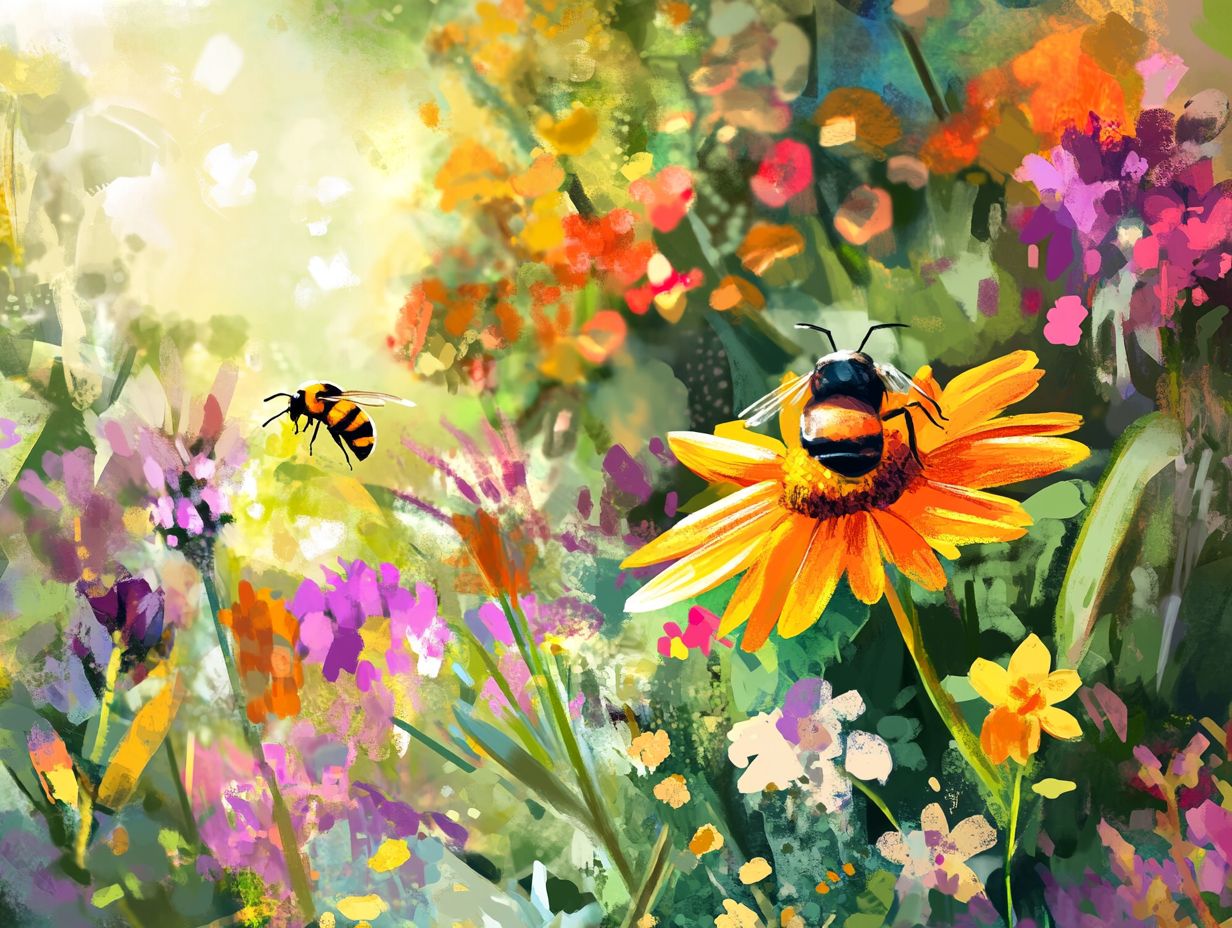
Creating bee-friendly environments calls for thoughtful habitat restoration, a conscious reduction in chemical pesticide use, and a commitment to fostering community action aimed at protecting and enhancing biodiversity. These efforts should also address the adverse effects of global warming and climate change on bee populations.
To embark on this journey, start by planting native flora in your garden. This not only provides essential food sources for bees but also attracts a variety of other beneficial pollinators. Imagine establishing conservation areas or pollinator gardens these safe havens offer vital refuge for these essential insects and help ease the pressures they face from habitat loss. Promoting bee-friendly policies can further support these initiatives.
By curtailing the use of harmful pesticides and embracing organic gardening practices, you can significantly bolster local bee populations. Collaborating with local organizations and participating in educational initiatives empowers you to advocate for expanded green spaces. Ultimately, this contributes to the health of entire ecosystems. This effort benefits not just bees, but a rich tapestry of wildlife and plant species as well. Even small actions, like planting wildflowers, can have a significant impact on supporting biodiversity.
Frequently Asked Questions
You may wonder why bees are crucial for our environment. Here are some commonly asked questions on their role and importance.
What is the role of bees in an ecosystem?
Bees play a critical role in pollination, essential for the growth and reproduction of many plant species in an ecosystem. Their activities also contribute significantly to maintaining the biodiversity of the region.
How do bees contribute to biodiversity?
Bees help maintain biodiversity by pollinating a wide variety of plants, which supports the survival of other organisms in the ecosystem. Their role in maintaining ecological balance cannot be overstated.
Why are bees considered keystone species in an ecosystem?
Bees are considered keystone species due to their important role in pollination, which significantly impacts the health and balance of an ecosystem. The decline of bee populations can lead to severe biodiversity loss.
What would happen if bees disappeared from an ecosystem?
If bees were to disappear, it would devastate the ecosystem, as many plants would not reproduce. This would lead to a decline in food sources for other organisms and cause significant disruptions to the ecosystem balance.
How do bees help with food production?
Bees play a vital role in pollinating crops. This process is essential for producing food and ensuring a diverse, healthy food supply.
What can individuals do to support bees in their ecosystem?
You can help bees by planting native flowers and avoiding pesticides. Create bee-friendly habitats and support local beekeepers and their products.
Join community efforts to protect these important pollinators. Every action you take contributes to bee conservation!

